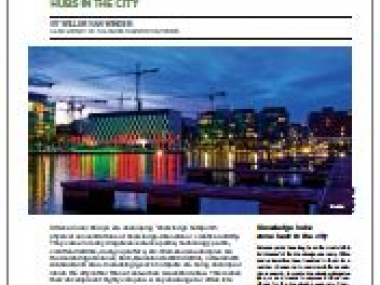Urban Hotspot 2.0 - The challenge of integrating knowledge hubs in the city
Edited on
28 October 2019Cities all over Europe are developing "knowledge hotspots" - physical concentrations of knowledge intensive or creative activity. Increasingly such hotspots are being developed inside the city rather than at suburban Greenfield sites. Read the article published in the URBACT Tribune "![]() Download Article_on_urban_hotspot.pdf (1.35 MB)" which looks at how cities can avoid these areas becoming elitist "ivory towers" and how they can integrate them economically, socially and physically into the urban fabric. Written by Willem Van Widen, Lead Expert of the REDIS project, this article draws on experience gained in the URBACT REDIS project made up of 8 cities that are developing such knowledge hubs.
Download Article_on_urban_hotspot.pdf (1.35 MB)" which looks at how cities can avoid these areas becoming elitist "ivory towers" and how they can integrate them economically, socially and physically into the urban fabric. Written by Willem Van Widen, Lead Expert of the REDIS project, this article draws on experience gained in the URBACT REDIS project made up of 8 cities that are developing such knowledge hubs.

Boosting the city profile by becoming a "city of knowledge"
"The competitiveness of Europe's cities will depend on their ability to provide lively and attractive environments for knowledge creation and exchange", explains Willem Van Widen.
Science parks have long been the most visible "addresses" of the knowledge economy. Cities keep on investing in them for numerous reasons, notably to create knowledge-intensive jobs. For instance Newcastle has for ambition to become a significant "city of knowledge" in the UK and this objective is part of the city strategy to recover from the economic and financial crisis. To do so, Newcastle is developing a large "science quarter" at a former brewery site in the city centre.
In the last decade, new types of "knowledge hubs" have been developed, around emerging thematic fields beyond science and technology. Creative industries have appeared as a promising growth sector. Barcelona designed such type of creative quarter with the @22 district.
According to Willem Van Widen, the economic development motives for investing in creative quarters are similar than the ones beyond the creation of more "traditional" science parks. However new types of knowledge hubs are different from an urban development perspective. They provide the more urban and lively atmosphere that fits the needs of the type of people who work there.
The challenge of integration: Good practices in Dublin and Magdeburg
The development of an urban knowledge hub and its integration in the city in a sustainable way are complex challenges. Many stakeholders are at play, and of course their interests differ. New urban knowledge hubs are thus places where these different interests fight.
To illustrate this, Willem Van Widen presents in his article two different case studies. The first case study focuses on Magdeburg, where efforts are undertaken to 'embed' the university campus in its surrounding. The second is Dublin, where a new knowledge hub is being developed as part of a disadvantaged neighbourhood. Each case highlights different aspects of integration.
Read more:
 Download Article_on_urban_hotspot.pdf (1.35 MB) - PDF
Download Article_on_urban_hotspot.pdf (1.35 MB) - PDF- URBACT Tribune - PDF
- REDIS - URBACT Website
Submitted by admin on



